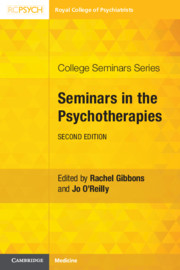Book contents
- Seminars in the Psychotherapies
- College Seminars Series
- Seminars in the Psychotherapies
- Copyright page
- Reviews
- Contents
- Contributors
- Foreword
- Preface
- Part I Therapy Theory and Practice
- Part II Applied Psychotherapeutic Thinking
- Section 1 Psychological and Psychodynamic Approaches to Psychiatry
- Section 2 Work in Practice
- Section 3 Contemporary Developments
- Chapter 26 The Open Dialogue Approach
- Chapter 27 Neuropsychoanalysis and Relational Neuroscience
- Chapter 28 Psychedelic-Assisted Psychotherapy
- Chapter 29 Psychotherapeutic Development through the Life of the Psychiatrist
- Index
- References
Chapter 29 - Psychotherapeutic Development through the Life of the Psychiatrist
from Section 3 - Contemporary Developments
Published online by Cambridge University Press: 27 May 2021
- Seminars in the Psychotherapies
- College Seminars Series
- Seminars in the Psychotherapies
- Copyright page
- Reviews
- Contents
- Contributors
- Foreword
- Preface
- Part I Therapy Theory and Practice
- Part II Applied Psychotherapeutic Thinking
- Section 1 Psychological and Psychodynamic Approaches to Psychiatry
- Section 2 Work in Practice
- Section 3 Contemporary Developments
- Chapter 26 The Open Dialogue Approach
- Chapter 27 Neuropsychoanalysis and Relational Neuroscience
- Chapter 28 Psychedelic-Assisted Psychotherapy
- Chapter 29 Psychotherapeutic Development through the Life of the Psychiatrist
- Index
- References
Summary
Life is a cycle as Keats’ poem beautifully illustrates.1 We progress through the seasons of life as we do with our professional lives, intertwining with our more private lives and our personal development. Shakespeare wrote about the seven ages of man [1] in As You Like It in the famous speech of Jacques when he compares the world to a stage and roles that we occupy as we pass through life. The psychoanalyst Eric Erikson developed his theory of the stages of psychosocial development [2] where we experience conflicts at each stage of development that need to be negotiated to feel a sense of mastery and develop a strong sense of self.
- Type
- Chapter
- Information
- Seminars in the Psychotherapies , pp. 373 - 384Publisher: Cambridge University PressPrint publication year: 2021

